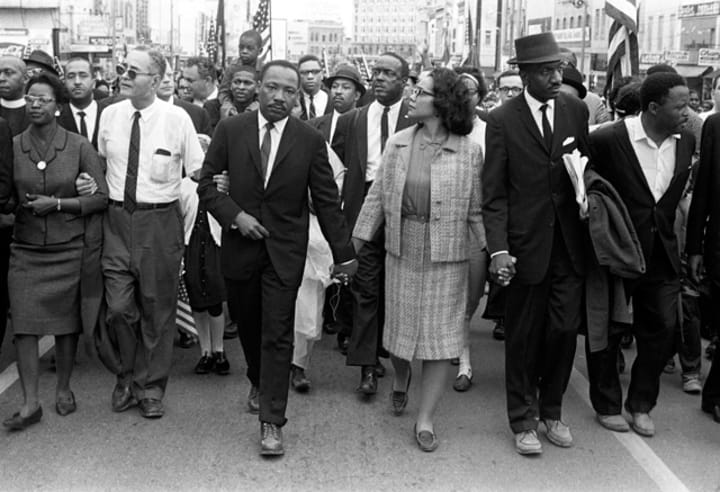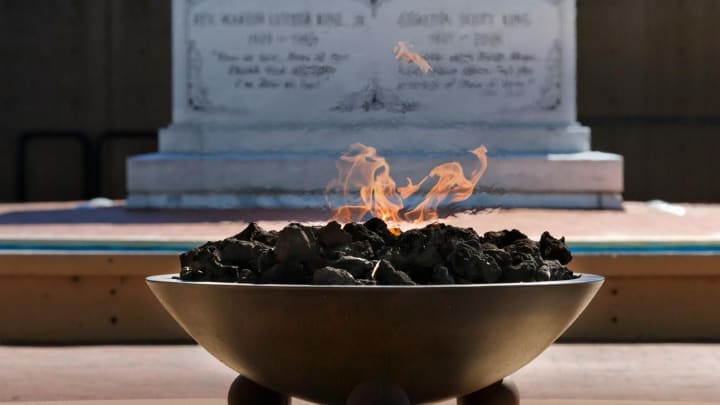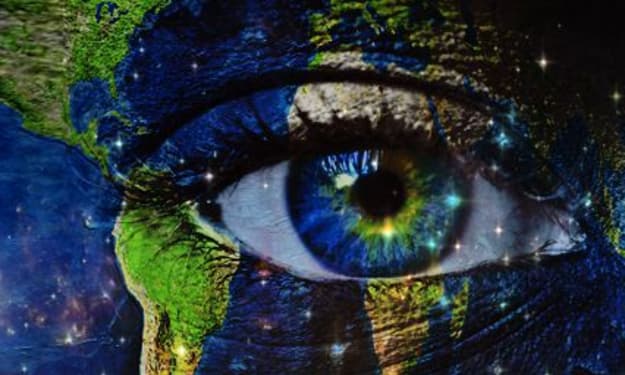Thirty Yards
Dr. Martin Luther King and I

30 Yards (1965)

The hatred outside my world first touched me at the age of eight on a cold March Sunday afternoon. While playing, a ruckus came from Alabama’s Highway 80, the road from Selma to Montgomery. I crossed the street and trespassed the base commander's yard to the perimeter fence that separated me from the world. At eight years old and the third of four boys, I had free rein within the base neighborhood. My fighter pilot dad, the Chief Test Flight Officer, had brought us to Craig Air Force base in Selma, Alabama. The students and instructors broke the jets, maintenance fixed them, and my dad performed the in-flight tests before returning to flight operations. The din from the highway grew louder.
A parade of people, escorted by the national guard, a T.V. van, followed by an endless column of people, mostly black, some white, organized six abreast, arm in arm, marched toward me. My grubby hands clasped the chain links as my face pressed to the fence, and my young mind was perplexed as two thousand strong sang, "Which Side are You on Boy?"
Which Side on you on, boy? (Civil Rights version)
Thirty yards away, a young black man, the leader in front, turned his head toward me as he sang and marched arm in arm. Our eyes stayed locked until they couldn't. I witnessed his determination, hope, and weariness. The words of the song from his mouth asked me, "Which Side are You on, Boy?" and I didn't understand the question or the answer. I stood transfixed until the two thousand strong had passed by and out of sight.
I asked my mother what the march was all about. She told me, “Freedom."
For many nights I soaked up the news for the first time in my life. Four days and fifty-four miles later, Martin Luther King Jr. appeared on television. He stood on the capitol steps in Montgomery, Alabama, where Jefferson Davis stood in 1861, where I stood during a recent school field trip, and he said,
"The end we seek is a society at peace with itself." The intensity in his eyes was unmistakable, and his previous question branded my young mind.
A Dose of the Real World
Six months later, fighter jets screamed overhead as I retrieved the football that had slipped through my small hands. Monikers like " lil boy, baby, and runt" were tossed at me by my older brothers, and random charlie horses to my sweating arms. Today they could see me.
I rubbed my bruised arm as a sleek flying war machine passed five hundred feet above. The high-pitched engines whined like a dentist drill and propelled across the sky on a base leg to the final. I made out the silhouette of the pilot and wondered, "Dad? Can you see me? "
My mom, in the carport, shouted to me in her east Tennessee accent.
"Let's go, you're riding with me," she said.
I didn't argue because the one fundamental law in the Wade house forbade it. The Wade Law: Never, ever, talk back to mom. To violate the code meant the death penalty, without appeal, with my dad as the executioner.
I clambered into the passenger seat of the cherry red 1964 MGB Roadster. My mom started the engine, and the machine purred. She lit a Benson and Hedges 100 and inhaled. The acrid scent of fresh smoke circled around my face.
"Where are we going?" I said as she exhaled the foggy carbons.
"To town, county courthouse, I have to register to vote," she said.
"Can we stop at the Burger Chef?" I said.
"Not today!" she said, placed the MGB in gear, and we set off to Selma.
The wind washed my face and danced with my mom's scarf as we crossed the muddy red Alabama River over the Edmund Pettus Bridge. She navigated the Sportster through town and into a parking space in front of the Dallas County Courthouse. The Selma sun was high in the sky and destroyed all shade. The Alabama heat burned, and sweat ran down my neck. Outside the courthouse, African Americans, in line twenty deep, stood outside the front door. To their right, a deputy stood guard at the door. The officer asked my mom what we wanted, opened the door, and gave directions to the Voter Registration office. The ancient building had been remodeled in 1960, and though new, it stunk of old sour sweat produced by fear.

An old man attended the counter and appeared as ancient and rude as the building.
"What do you want?" he said without looking up.
"To register to vote," my mom said.
The clerk removed his reading spectacles and inspected us with his mousy eyes.
"Have you taken the history test yet?" he said.
"What history test?" my mom said.
"The test everyone has to take, since.... well....since the new Voter Law passed! You're not from around here are you?" he said.
Alarm bells rang in my head, and I held my breath as I sensed my mom's agitation at his attitude. I expected Captain Wade, the executioner, to appear at any time. The dutiful Air Force officer's wife, my mom, regained her composure and replied in her East Tennessee accent.
"No, I am from Alcoa, TN, but we are all Americans, correct?"
The surly clerk gave her a slip of paper.
"Go to room 105 and take the test, then come back here. You will need the answers on the paper to pass," he said.
Like an obedient soldier, I followed my mom to room 105. She took the five-question history test and received a receipt with instructions to return it to the clerk. My mom remained silent, and I knew she was mad and an ugly execution inevitable.
After receiving the voter registration card, we left the courthouse. The deputy who guarded the door had left, and my mom ordered me to wait on the step. I obeyed. She walked straight to the first black man waiting in line.
"Are you here to register to vote?" she said.
"Yes, ma'am, we are trying to find out the questions for today's history test. We have folks on standby at the library to find the answers," he said.
My mom handed him the slip of paper with the answers because no one had asked them to be returned. His eyes lit with relief and met my mom's eyes.
"Grateful, Ma'am! Most days, we register five, now we might register twenty or more," he said and pointed behind her, "but you're gonna be 'n trouble."
The deputy had returned and witnessed the interaction between my mom and the man.
"Ma'am, you can't be talking to him," he said, "You need to move on!"
My mom, her nostrils flared, turned to the deputy.
"I can talk with whomever I please," she said.
A police cruiser, with its blue bubble ornament and Sheriff moniker on the side, pulled up in front of us and stopped. The scene could have been straight out of Andy Griffith's Mayberry TV show. An overweight uniformed man with a Bama belly, held up by an overworked thick black belt, and a demonically mean face exited the car.
"What's going on here?" he said.
"This woman is disturbing the peace," the deputy said and nodded toward the line of blacks trying to register. "She's upsetting the balance."
The Sheriff stepped forward and ordered my mom to show some identification. She took my hand, and we approached the Sheriff.
"Identification, ma'am!" The Sheriff repeated, and I thought, who is this man? He doesn't know my dad.
My mom presented her driver's license and military I.D. The Sheriff studied them, and his face reddened.
"You're one of those," he said with a mint julep drawl. "You outsiders are always sticking your nose where it doesn’t belong. I should charge you with disturbing the peace ma'am. I'm ordering you to leave town. Now!"
My mom took her I.D. back, led me to the MGB, and we headed back to base. I heard her whisper, "Freedom."
The previous March's parade rolled through my confused mind, and she remained silent as we crossed over the river and left Selma behind. The wind danced in her hair, and her face erupted into a smile that outshone the sun. Some mission had been accomplished, and she turned into the Burger Chef. The burger smoke tickled my nose, and I smiled too.
The Real World (1967)
My dad piloted the MGB, with me as honorary co-pilot, in formation behind our white 1963 Rambler Station. I imagined the roadster a fighter jet and the wagon a cargo plane. We were on a mission. I was lucky not to be crammed into the wagon with my mom, brothers, two dogs, and ten suitcases. We turned onto Main Street, of historical Summerville, S.C. The Flowertown in the Pines was our new home. My dad had retired from the military and was now a civilian. A cultural collision loomed before me like a runaway freight train out of the dark of night, but I didn't know it.
On the first day of school, I had excitement for breakfast and confusion for dinner. Air Force schools were multicultural as President Eisenhower, in the 1950s, had issued the directive There would be no segregation and racism in the U.S. Military. My classmates had been red, white, black, brown, and white. Iranian, Japanese, Indian, and Americans of every ethnic blend participated in the pilot training program. As their children, we swam, ate, played, and shared birthday parties together. I was colorblind.
My baptism into the actual culture of the South began the second day, and it tore my skin. My new teacher Mrs. Turner took me aside at recess.
"How are you doing?" she said, "Do you have any questions?"
"Where are the other children?" I said.
"What other children?" she said.
"Why are only white people here?" I said.
"Why would you ask a question like that?" she said.
Mrs. Turner never answered my question but, over time, treated me with suspicion and never called on me in class. She didn't like me. Kids learn these things. Unassisted, I struggled in school.
Doty Field, Summerville SC (1968)
I was at Doty Field, near the railroad tracks which split the two sides of town, for a friend's baseball game. The fresh hints of spring with azaleas blooming, fresh-cut lawns, cherry tobacco pipe smoke, and popcorn wafted through the air. Yellow pollen, like powdered mustard, floated everywhere and altered my favorite color, green. The hot dog bites were as tasty as filet mignon and slid down my gullet. My mouth watered with the expectation of the popcorn ball chaser to follow. I enjoyed the arena of bats cracking, leather popping, and the coach's shouts as they played the All-American sport.
I soon learned two games were being played, one on the field and the other behind the bleachers. One had rules, and one didn't. One was picturesque America, and the other one was ugly. One played in the light and the other in the shadows.
My awareness tuned to shouts behind the bleachers. Startled, I stopped eating, turned, and listened. Four older teenagers had stolen bats away from some younger kids playing.
"We're going to Germantown, the black community, to bash some heads, who's coming?"
The question wasn't an invitation as much as a litmus test. The biggest boy made challenging eye contact with me, and I shook my head no. He pointed the bat toward me.
"You a chickenshit?" he said.
I turned around to ignore them, washed my mind clean, and watched the game in the light.
The game ended as the gang of bashers paraded back to Doty Field. They walked past my bleacher. Like liquid red velvet, scarlet blood dripped off the bats into the green grass. They tossed the bats where the kids had been playing and left the park. Their loud vulgarity faded away, and I couldn't move. My mind had connected their threats with the evidence. My body caught up with my mind, revolted, and I expelled hot dogs, popcorn, and that night's all-American memories onto the ground. I rejected all things false from that night and left in a daze of sadness.
When I arrived home, my dad sat in the den and stared at the television well after the news hour. Something important had happened.
Walter Cronkite, with his head down, illuminated the screen. I had seen him this way before, and the visual connected my short past to the present.
He said, "At 6:01 pm this evening, in Memphis, Tennessee, Dr. Martin Luther King Jr. was fatally shot at the Lorraine Hotel......"
Dr. King's picture filled the screen. The eyes that had stared into mine, one thousand one hundred and six days earlier, in Selma, Alabama, stared at me again.
They had murdered him!
Shattered, I went to my room and cried. That night, in a dark dream, the teenage boys of Doty Field, with hate, beat Dr. King with their baseball bats as his eyes were locked on mine. He questioned, "Which Side are You on, Boy?" I awoke shaken, ashamed for not standing up to the boys of Doty Field.
Integration (1970)
The bus stopped on the gravel drive that I would come to learn intimately. The loading area surrounded Alston Middle School like a perimeter fence. Like lambs, we were herded off the yellow contraption of sheet metal and ribbits into a tense and hostile atmosphere. I followed my seventh-grade shepherd to my new class. With old drab green walls and tile, the building felt more like a prison than a school. I had never seen bars on windows at a school.
Alston middle school, formerly Alston High School, was located across town and on the other side of the tracks. Desegregation had begun.
Alston High School colors of Blue and Gold still adorned the auditorium. The two high schools in town had been merged by force of federal oversight and the reluctance of the local school board into one. Fear reigned in every face, black and white, and the campus stayed segregated. Whites gathered in the front and blacks in the back, a mirror of the Jim Crow era. The cafeteria, like a DMZ, was somewhere you entered at your own risk. The race war raged around us.
Young men from the black community were often seen on the perimeter of campus. Students who refused to be bused to the "All New Summerville High School" were designated dropouts. They paced along the border and sought prey to assuage their anger. Like predators, they tracked our movements like we were a herd of Gazelles and hoped for a straggler. The boys of Doty Field had set a violent precedent, and any intruder found alone would be hurt. It didn't matter that we were twelve and thirteen years old. We were the white gazelles that had invaded, stolen, and destroyed the tradition and future of Alston High School. The stink of fear hung in the air like the tinny odors of blood that drifted from a slaughter yard.
The last bell rang and alerted me that the buses were departing in five minutes. Like a gazelle, I ran down the long curve of the D hall towards the bus line. The cool air of October slapped me as I pushed open the side door to the driveway. The yellow gooses, already loaded, rumbled, and spewed their toxins into the air. I would have to run the gauntlet alone. I ran for my bus like an Olympian from Greece.
The thirty yards became twenty, fifteen, ten, the bus door drawing me like the end zone draws the quarterback. I slowed, believing I would arrive in time, when a lightning-like bolt struck my back. I hit the ground face first, and my books scattered everywhere, like a game of fifty cards pick up. I couldn't breathe, and my face burned from the gravel cuts and scrapes. In shock, I turned my skinned and bleeding face to see what had hit me. An apoplectic interloper, an angry young black man, flashed a knife, screamed at me,
"I'm going to cut you bo....!"
The last word never left his mouth as Mr. Floyd, an Assistant Principal and ex-Marine, tackled him and drove him hard into the gravel drive. Mr. Floyd pinned the interloper and yelled at me.
"Run to the bus, Go!"
I scrambled up and ran, leaving my skin, blood, and books abandoned on the gravel, to the bus and escaped.
No report, no phone call, or letter came to my parents. My books were returned to my homeroom class as the incident had never happened. My skin healed, but my mind and heart became scarred. I hated life at Alston Middle School. The lessons of Selma, Doty Field, and Dr. King were buried in the recesses of my mind.
Thirty Yards, Dr. King Revisited (2019)
I was excited to be on the road to Atlanta with my adopted family for three days of rest and relaxation and to attend the Atlanta Falcons versus Seattle Seahawks football game. We also came to support my close friend's son, Grady Jarret, number ninety-seven, the spectacular Falcon's defensive tackle. Unbeknownst to me, this journey would rupture hidden memories, transport me like an imagined time machine, and connect my present to my past. The random conspiracy began with my lodging at Midtown near Piedmont Park.
Early Sunday morning, prior to the game, I walked the three blocks to Piedmont Park for a stroll. Midtown Atlanta must have a rule on Sundays, "all roads, with dogs and their partners, lead to Piedmont Park." I stopped near the entrance gate, sat on a bench, sipped my java, and enjoyed the parade.
The symphony of the parade sounded in the wind, the murmuring of inarticulated voices, the occasional roar from the soccer fields, and the laughter of children playing. Cool air swirled with the scents of autumn leaves alive, falling, and dead. The eclectic, unrehearsed parade continued, with blacks, reds, whites, browns, and grays through people of all races and pets of all breeds against the backdrop of green with burnt edges.
Reposed, I read a historical marker documenting the history of the park created in 1895. It headlined "Race and Reconciliation" The Park had witnessed civil war battles, international Expos, race riots, lynchings, collegiate sports, segregation, and Jim Crow. Once a nexus of evils, Piedmont Park had become a fusion of harmony. I left the park with a strange sense, a haunted emanation from the soil that cried out not to be forgotten.
What am I forgetting? I'm just here to relax.
Monday morning, the haunted emanation from Sunday returned and throttled my mind. We had an impromptu plan for that day's itinerary. We ate a late breakfast at the Flying Biscuit Cafe on the corner of Piedmont Ave. The cold phantom of Piedmont Park had nudged me to search online for a forgotten point of interest in Atlanta, and I suggested we go to a National Park downtown. Everyone agreed, and we made the two-mile walk through the heart of Midtown. I walked, troubled but drawn by a beacon that promised resolution, and I could only hope as the sunshine and presence of my adopted family warmed me. The historical streets lead us to Ebenezer Baptist Church and Martin Luther King Jr. National Park.
Melancholy burned in my heart as I sat in the garden by the eternal flame as my mind soaked in the waters of the reflection pond. I bore witness to the tombs of Martin Luther and Coretta Scott King thirty yards away. At the same time, his voice, over the sound system, piped his prophecies that echoed throughout eternity. I was entranced.
After a time, my veiled adult memory burst, the hardened shell of my childhood, and returned me to March 21, 1965, Craig Air Force Base, Selma, Alabama.
I recalled the day.
Thirty yards away, a man in a black suit, in the middle front, the leader, sang, turned his head to me. Our eyes stayed locked until they couldn't. I observed determination, hope, and weariness. The words from Martin Luther King's mouth sang and asked me that question. "Which Side are You on, Boy?"
I understood the question now and whispered the answer, "The right side."
And now, Thirty yards away, no more, no less, I sat spiritually close. Humble, embarrassed, and relieved, I remembered what I had forgotten. Dr. King's words:
"The end we seek is a society at peace with itself."
I thought of the march for freedom, the demonic Sheriff, the courthouse in Selma, my insensitive teacher Mrs. Turner, and the mean boys of Doty Field. I recalled the man that attacked me by the bus. I pondered the history of Piedmont Park and its transformation.
The realization overwhelmed me that hate still exists, and I must do my part for society to be at peace with itself.
My adopted family sat nearby as I gazed through the eternal flames, across the reflection pool to Dr. and Mrs. King's tombs only thirty yards away but felt like one. I swore on his memory to be bold, love everyone, and never forget again what he taught us. The cold phantom of my complacency lifted from me and was consumed in his eternal flame.

About the Creator
J. S. Wade
Since reading Tolkien in Middle school, I have been fascinated with creating, reading, and hearing art through story’s and music. I am a perpetual student of writing and life.
J. S. Wade owns all work contained here.
Reader insights
Outstanding
Excellent work. Looking forward to reading more!
Top insights
Easy to read and follow
Well-structured & engaging content
Excellent storytelling
Original narrative & well developed characters
Heartfelt and relatable
The story invoked strong personal emotions






Comments (3)
Your story cast its light on the past with such clarity and strong emotion that it is impossible to keep from being completely immersed in it from the very first line. Very well written and a beautiful tribute to Martin Luther King Jr.
Such a raw and inspiring story! Wow!
Oh my Scott!!! I am typing this quite, quite overwhelmed. What a journey. What insight. What a story!!! The bravery in all of this is magnificent. I am in awe... and your mum... what a hero! My goodness me, this is poignancy personified.